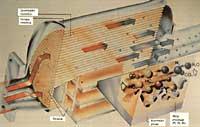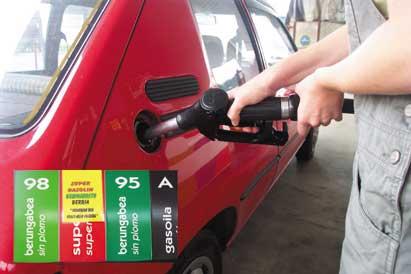Diesel or lead-free?
2001/07/01 Carton Virto, Eider - Elhuyar Zientzia Iturria: Elhuyar aldizkaria

Lead is one of the most dangerous compounds known for its body buildup and serious health problems. It interferes in the synthesis of hemoglobin, causes anemia, disturbs the functioning of kidneys, liver and sand, and affects the nervous system. Lead poisoning is always serious and more so in children. In the long term they can cause irreversible neurological damage, such as decreased intelligence, delays in motor development, impaired memory and hearing and balance problems. In addition, both during pregnancy and during lactation, the child can receive lead through his mother, so women should be especially careful.
Living beings collect lead through three ways: ingestion of lead and food drinks, inhalation of lead air or even through the skin if lead is in an organic state. Once inside the body, lead spreads to all the organs where it is stored. In bones, for example, 95% of the lead that arrives accumulates and it takes years to remove the metal.
About 25 years ago scientists realized the harmful nature of lead and gradually we are removing lead from the environment. On that road, the ban on super gasoline has been an important step. 90% of the lead in the air is emitted by vehicles.
Why leaded gasoline?
Lead is so harmful, how has it been used for so many years in gasoline? The reasons may be several, but above all two, because lead performs two very interesting functions at the same time and is cheap.
In the engine of most vehicles, air and fuel are introduced into the cylinder and compressed so that a spark explodes and gets the power that moves the vehicle. In the 1930s, in order to give more power to the engine, it began to manufacture engines that used a greater compression and incorporate lead to gasoline. Lead is a very good anti-explosion additive, protects the engine and increases the number of octane from gasoline.
The number of octane is related to the quality of gasoline. Gasoline is a mixture of hydrocarbons composed mainly of octane, 8-carbon hydrocarbon. Therefore, the number of octane indicates the number of octane present in the mixture. But why is octane so interesting? When cylinder compression is high, small hydrocarbons are spontaneously exploited without sparks and do not give power to the car, while the octane holds compression well. But in refineries there is no pure octane, among other things because it is very expensive, and it is usually a mixture of octane gasoline and heptane.

The incorporation of lead and manganese compounds 70 years ago was the cheapest way to increase the octane number of gasoline and, at present, it is. Common additives are tetraethyl lead (PET) and tetramethyl lead (TMP). They considerably increase the octane number of gasoline and lubricate engine parts. However, from the 1970s, by environmental awareness, gasoline began to reduce its lead amounts and unleashed unleaded gasoline. At the same time cars with catalyst appeared.
An ideal car should only emit water vapor, carbon dioxide and nitrogen, but our cars are far from the ideal model and emit carbon monoxide, nitrogen oxides and inburned hydrocarbons into the atmosphere. The latter are more harmful than the first ones, so inside the exhaust pipe a catalyst is placed that makes these molecules react with oxygen to convert them into carbon dioxide, nitrogen and water vapor. The catalyst, however, has palladium and platinum and lead deteriorates if covered. Filling the fuel tank with lead gasoline twice is enough to completely destroy the catalyst. Therefore, cars with catalysts to control pollution cannot use leaded gasoline.
The installation of catalysts in cars in Europe began in the 1980s and oil companies had no choice but to start producing unleaded fuel, but they spent 10 years producing unleaded gasoline of a relatively large number of octane. Meanwhile, the technology of car engines also improved and now cars are manufactured that do not need the protective function of lead from 10-11 years. However, for economic and political reasons, super gasoline has not withdrawn from the markets so far.
Considerations From now on and for two years at the gas stations replaces the super gasoline. Substitute gasoline will have the same composition and properties as superr (including price), but the role of lead will be played by other additives, sodium salts, potassium and phosphorus. Only cars that now use the super and are over 10-11 years old will need spare gasoline and, in addition to gasoline, it will not be necessary to add a special additive to the car. After two years, the spare gasoline will disappear from the service stations and, in that case, it will have to be taken lead-free and added additives. |

Gai honi buruzko eduki gehiago
Elhuyarrek garatutako teknologia





